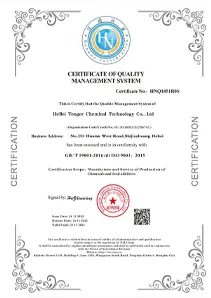
types of emulsifiers in food
Types of Emulsifiers in Food
Emulsifiers are essential ingredients in the food industry, playing a critical role in maintaining the stability and texture of many products. They are compounds that help blend two immiscible liquids, such as oil and water, creating a stable emulsion. This article will explore the various types of emulsifiers used in food, highlighting their functions and sources.
1. Natural Emulsifiers
Natural emulsifiers are derived from plant or animal sources. They are often preferred in clean-label products due to their minimal processing and perceived health benefits.
a. Lecithin Lecithin is one of the most widely used natural emulsifiers, commonly extracted from soybeans, eggs, or sunflower seeds. It contains phospholipids that help reduce the surface tension between oil and water, making it easier to form stable emulsions. Lecithin is prevalent in chocolate, margarine, and baked goods.
b. Mono- and Diglycerides These are derived from the glycerol backbone and fatty acids. They are made through the esterification of glycerol with fatty acids, which can be obtained from both animal and plant fats. Mono- and diglycerides can help improve the texture and shelf-life of products like ice cream, mayonnaise, and salad dressings.
c. Casein and Whey Proteins These proteins, found in milk, act as natural emulsifiers. Casein, in particular, is effective in stabilizing emulsions in dairy products and is widely used in cheese and yogurt production.
2. Synthetic Emulsifiers
Synthetic emulsifiers are chemically engineered compounds that offer consistent performance in stabilizing emulsions. They are used in a wide range of processed foods.
a. Polysorbates Polysorbate 20 and Polysorbate 80 are examples of synthetic emulsifiers that are commonly used in food products. They are particularly effective in stabilizing oil-in-water emulsions and are found in sauces, dressings, and ice creams. These emulsifiers help improve the texture and mouthfeel of products.
types of emulsifiers in food

b. Sucrose Esters Sucrose esters are produced from the esterification of sucrose with fatty acids. They function as emulsifiers, thickening agents, and stabilizers, making them popular in low-fat and reduced-sugar products. Sucrose esters can improve the texture of baked goods and are also used in dairy products.
3. Food-Grade Emulsifiers
Food-grade emulsifiers are specifically designed to be safe for consumption, following rigorous food safety standards.
a. Sodium Stearoyl Lactylate This emulsifier is derived from lactic acid and stearic acid and is often used in bread and other baked goods. It enhances dough stability and improves bread volume, making it an essential ingredient in commercial baking.
b. Calcium Stearoyl Lactylate Similar to sodium stearoyl lactylate, this emulsifier is mainly used in baking. It helps to strengthen the dough and improve the texture of the final product.
4. Functions of Emulsifiers
The primary function of emulsifiers in food is to create stable emulsions, but they also offer additional benefits
- Texture Improvement Emulsifiers enhance the mouthfeel and texture of food products, providing a smooth and creamy consistency. - Shelf-Life Extension By stabilizing emulsions, emulsifiers prevent phase separation, extending the shelf life of products like salad dressings and sauces. - Foam Stabilization In products like whipped toppings, emulsifiers help stabilize foams, ensuring that they maintain their structure over time.
Conclusion
Emulsifiers are vital for the formulation of numerous food products, ensuring stability, texture, and overall quality. With a variety of natural and synthetic options available, manufacturers can select the optimal emulsifier to meet their product requirements. As consumer preferences continue to evolve, the demand for clean-label and natural emulsifiers is likely to rise, prompting ongoing innovation in the field of food emulsification. Understanding the types of emulsifiers and their applications can help consumers make informed choices about the products they include in their diets.
-
Pure Sodium Dichloroisocyanurate Dihydrate | Powerful DisinfectantNewsAug.29,2025
-
Industrial Chemicals: Quality & Purity for Every IndustryNewsAug.28,2025
-
Nitrile Rubber Honoring Strict Production StandardsNewsAug.22,2025
-
Aspartame Ingredients Honoring Food Safety ValuesNewsAug.22,2025
-
Fertilizer for Balanced Plant NutritionNewsAug.22,2025
-
Cyanide Gold Processing with High Purity AdditivesNewsAug.22,2025
-
Formic Acid in Textile Dyeing ApplicationsNewsAug.22,2025
Hebei Tenger Chemical Technology Co., Ltd. focuses on the chemical industry and is committed to the export service of chemical raw materials.
-

view more DiethanolisopropanolamineIn the ever-growing field of chemical solutions, diethanolisopropanolamine (DEIPA) stands out as a versatile and important compound. Due to its unique chemical structure and properties, DEIPA is of interest to various industries including construction, personal care, and agriculture. -

view more TriisopropanolamineTriisopropanolamine (TIPA) alkanol amine substance, is a kind of alcohol amine compound with amino and alcohol hydroxyl, and because of its molecules contains both amino and hydroxyl. -

view more Tetramethyl Thiuram DisulfideTetramethyl thiuram disulfide, also known as TMTD, is a white to light-yellow powder with a distinct sulfur-like odor. It is soluble in organic solvents such as benzene, acetone, and ethyl acetate, making it highly versatile for use in different formulations. TMTD is known for its excellent vulcanization acceleration properties, which makes it a key ingredient in the production of rubber products. Additionally, it acts as an effective fungicide and bactericide, making it valuable in agricultural applications. Its high purity and stability ensure consistent performance, making it a preferred choice for manufacturers across various industries.





